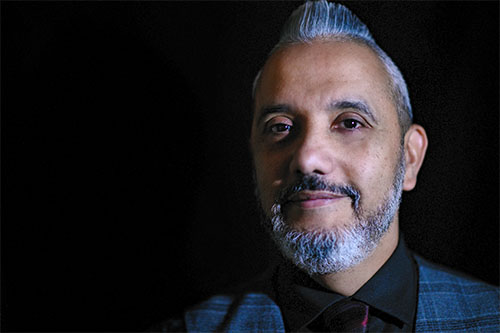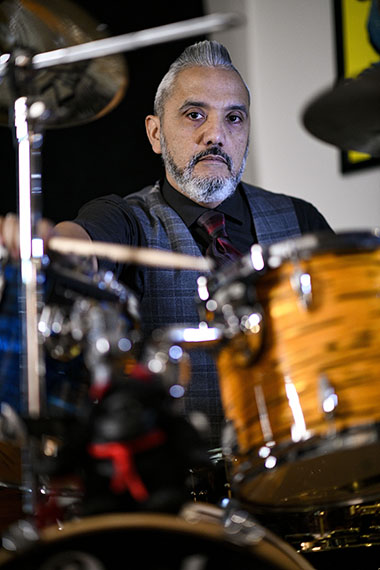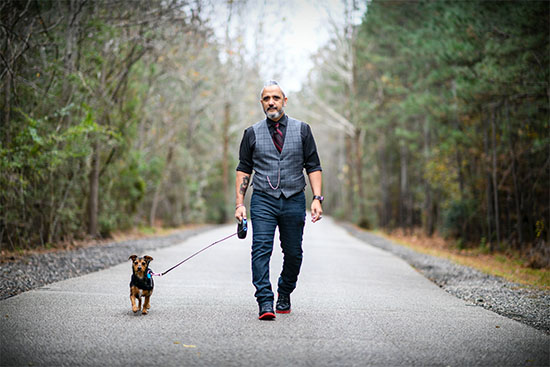When Music Speaks: Warrior Picks Up the Beat Again After Traumatic Brain Injury

Army veteran Paul Delacerda has played drums since age 9. He started touring with his first band at 17. So, after an IED attack in Iraq sidelined his Army career, he thought he would pick up music again. Not so easy after a traumatic brain injury (TBI).
Paul remembers his first open mic after being injured. “The club owner came up to tell me I was playing behind the beat,” Paul said. “He didn’t close the door, though; he just told me to practice and come back when I was better.”
Paul was determined and taught himself to play drums all over again. He returned in eight months to much praise. He even said that relearning allowed him to develop better habits. Within three years, he founded a new rock band comprised of veterans.
“Drumming is very physical, and with a TBI, you tend to get hyperactive, but when I play, I sleep like a baby,” Paul said.
Drumming is way more than music therapy; Paul found a new mission through his music. If he could do it, other veterans could do it.
“After playing again, I realized other warriors should have a chance to do this,” Paul reflected. “Being on stage gets you over the fear of being in front of people. It’s also a positive way to express your talent. When words fail, music speaks. If you can’t say it, then play it.”
Playing His Way Back to Life and to Heritage
Paul has music in his blood. His dad was a mariachi singer and guitarist in Houston, Texas. His maternal grandfather was a composer, and an uncle played the drums – inspiring Paul to play. Military service is part of his heritage as well: Paul’s dad served in the Air Force and Paul’s brother and uncle both served in the Army.
Paul first joined the Army in 1995. He reenlisted after 9/11 and was deployed to Iraq in 2005. During most of his 15 years of active duty, he served as an infantry paratrooper, logging 128 jumps.
He hurt a knee in a jump and had to briefly leave active duty. Within a few months, 9/11 happened and Paul rehabbed his knee so that he could reenlist. Paul had a total of nine deployments. The day of the TBI injury, Paul and his unit were clearing a road of IEDs. He was in the lead vehicle that took the brunt of the IED detonation and the shock wave. Paul didn’t know it immediately, but he would end up with tinnitus and TBI. A fellow soldier had a ruptured ear drum.

“It took two or three months before I realized I had TBI,” Paul said. “I was back home at a Walmart parking lot and could not remember where I was or why.”
After that episode of memory loss, Paul saw a doctor and was diagnosed with TBI. He realized PTSD triggers were affecting him as well. He noticed he felt as if someone was switching channels in his head, and each channel had a different memory – indicating flashbacks to combat situations.
But Paul approaches life with a “never quit” attitude. “There’s no option but to not quit,” Paul said.
His persistence with music brought along other benefits.
“When I play music, I focus on the beat,” Paul said. “All the bad noise, including PTSD, goes away, and all the good noise that I need stays there. I get rid of all the bad; it just disappears while I’m playing.”
Paul also reached out for assistance. He had heard about Wounded Warrior Project® (WWP) while still in the Army’s Warrior Transition Battalion in 2006.
“Over the last 15 years, Wounded Warrior Project has been there for me in a lot of different ways that I didn’t know I needed until it happened,” Paul said. “The fact that Wounded Warrior Project staff show support for my band and my music is one of the best things. They also check in and call me and make sure I’m OK. They support my ventures and that helps me, and it helps other warriors. What I do for my community is a product of what Wounded Warrior Project does for me.”
Paul formed the first nationally recognized veterans rock band, Vetted. Through several band iterations, Paul pulled together other veteran musicians to perform at military bases, veteran gatherings, and music festivals. He also provides music therapy opportunities for veterans in the Houston area.
Paul invites other veterans to express themselves through music, expanding on their connections, and fostering creativity. The camaraderie is spontaneous.
“Just being around other veterans, you connect on a different level. You don’t even know these guys, and you end up congregating in a circle and talking about shared experiences,” Paul said.
“The connection is really important and it’s already there,” he said. “Music brings all that together. You can be veterans from different eras, but when you’re all in the same room, it’s remarkable how everything else just goes away, you become fast friends. Sometimes you connect on a level where you become best friends. And you stay connected for years on end after that.
“The best part is the family element of it, because Wounded Warrior Project also has a way of connecting families so they can understand what their warrior is going through. I’ve met a lot of veterans that, to this day, stay in touch.”
Empowering Other Veterans
Paul started a podcast called “Warriors Voice Radio” and a music therapy nonprofit in Houston called Rock4Recovery. “As a wounded warrior, that was my call: to connect with warriors through music,” Paul said.
A pivotal moment in Paul's musical journey came when his band, Vetted, took the stage at the 2016 Invictus Games, hosted by Prince Harry. It was a moment that brought together all the good things Paul had been working toward. Their set captivated an audience of 50,000 and played on ESPN and BBC. Next on their agenda, Vetted will take the stage on the USS Bataan to close Fleet Week Miami 2024, a prestigious event welcoming sailors, marines, and Coast Guard members to sunny Florida.
Music has brought Paul out of the dark each time he needs it, and he generously pays it forward. From his first tour as a drummer at age 17 to his reconnection to veterans through music to his own musical roots, his commitment to connecting veterans is unwavering.
“My goal is to empower others through music and a rediscovery of their talents,” Paul said.
Through WWP’s emotional support programs, adventure-based workshops, clinical care, and connection opportunities, warriors and their families can build the resilience they need to overcome mental health challenges, including post-traumatic stress disorder (PTSD), TBI, and more.
Contact: Raquel Rivas – Public Relations, rrivas@woundedwarriorproject.org, 904.426.9783
About Wounded Warrior Project
Since 2003, Wounded Warrior Project® (WWP) has been meeting the growing needs of warriors, their families, and caregivers — helping them achieve their highest ambition. Learn more.
